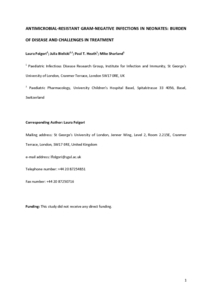Folgori, L; Bielicki, J; Heath, PT; Sharland, M
(2017)
Antimicrobial-resistant Gram-negative infections in neonates: burden of disease and challenges in treatment.
Curr Opin Infect Dis, 30 (3).
pp. 281-288.
ISSN 1473-6527
https://doi.org/10.1097/QCO.0000000000000371
SGUL Authors: Heath, Paul Trafford Sharland, Michael Roy Folgori, Laura
![[img]](https://openaccess.sgul.ac.uk/108721/1.hassmallThumbnailVersion/Folgori_CurrOpinInfectDis_2017.pdf)  Preview |
|
PDF
Accepted Version
Available under License ["licenses_description_publisher" not defined].
Download (538kB)
| Preview
|
Abstract
PURPOSE OF REVIEW: This review summarizes the main challenges of antimicrobial resistance (AMR) in the neonatal population with a special focus on multidrug-resistant (MDR) Gram-negative pathogens. RECENT FINDINGS: MDR-Gram-negative bacteria are a great concern in the neonatal population, with a worldwide rise in the reported incidence and with very limited therapeutic options. Extended-spectrum β-lactamase and carbapenem-resistant Enterobacteriaceae (CRE) have been reported as responsible for neonatal ICU outbreaks. Hospital data from low/middle-income countries show high proportions of isolates from neonates resistant to the WHO first-line and second-line recommended treatments. The spread of CRE has resulted in old antibiotics, such as colistin and fosfomycin, to be considered as alternative treatment options, despite the paucity of available data on safety and appropriate dosage. SUMMARY: Improved global neonatal AMR surveillance programmes including both epidemiology and clinical outcomes are critical for defining the burden and designing interventions. The optimal empiric treatment for neonatal sepsis in settings of high rates of AMR is currently unknown. Both strategic trials of older antibiotics and regulatory trials of new antibiotics are required to improve clinical outcomes in MDR-Gram-negative neonatal sepsis.
Statistics
Item downloaded times since 23 Mar 2017.
Actions (login required)
 |
Edit Item |



